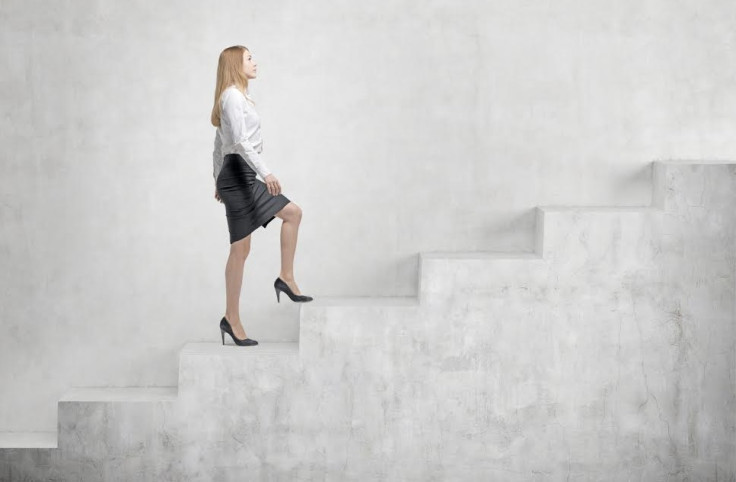Middle-class feminists smash glass ceilings - then leave sisters languishing behind

Women are rising, awakening, organising, speaking out, breaking out, kicking down barriers, at times taking control. Hillary Clinton may just beat the gross and erratic Donald Trump to become the first female president of the US. In the UK, the Women's Independent Party (WEP), founded by comedienne Sandi Toksvig and journalist Catherine Mayer in July last year, fielded candidates in the Mayoral and local elections and was backed by famous names such as Emma Thompson, Caitlin Moran, Jo Brand and Lilly Allen. Nationally, it managed to get 350,000 votes - pretty impressive for a movement which is not quite a year old. The Telegraph describes WEP as the 'fastest-growing political force in the UK'. Harriet Harman is kicking up (again) about the largely male Labour Party leadership and also warns that leaving the EU would take away the workplace rights women had acquired in recent years.
In the spring, young women working in the media were so exasperated by the UK Press Awards mainly male shortlist, that they organised a funky event and handed prizes to spirited, super- talented female journalists. Old fogeyish male editors invited to the party looked discomfited and chastened. The Everyday Sexism project, founded by Laura Bates in 2012, exposes the harassment and constant hum of sexist banter and insults experienced by women and girls. This website has accumulated real soft power and made young women more assertive. Last week, Nicola Thorp, 27, a part-time temp worker at city accounting firm, PriceWaterHouseCoopers, was told by her agency that she had to wear high heels at work. She refused, protested and organised an online petition, which got global media coverage and the backing of many MPs. Such sexist dress codes may soon be made unlawful. Robin Wright also threatened Netflix that'd she'd go public unless she got the same pay as Kevin Spacey in House Of Cards.
The signs are good and augur more dignity and rights for females.
Equality for women is now taken seriously by bosses, politicians, public institutions and the media. Although sexism and sex discrimination still blight our lives and internet persecution is nasty and intimidating, there is dynamism where once there was hopelessness and pessimism.
As one feisty, elderly Baroness said to me recently: "My dear, you girls did change the world. In my day, men thought we were pests, whores or fools. We were fearful, thought we had to be pretty little missies and win the old rogues over. It wasn't right. Now I see Laura Kuenssberg and Theresa May and am quite, quite envious'.
Yes we activists, feminists and modernists have made gender parity acceptable and respectable. Real advances are evident in the home, workplace and society. But did we really change the world? No. Some feminists are indeed climbing fast up the ladders and shattering glass ceilings. Unfortunately as they go higher they lose sight of the sisters languishing below.
Equality struggles, ironically, can lead to some new inequalities and widen the chasms between those who get access and chances and the voiceless and generationally disadvantaged.
Progressive campaigns often can't see (or don't look) beyond their own virtuous circles. Equality struggles, ironically, can lead to some new inequalities and widen the chasms between those who get access and chances and the voiceless and generationally disadvantaged. This is not what the struggle was for or about. Feminism can become a closed shop and self-reverential. So far it has done more for mostly middle class, highly aspirational women.
I am middle class, highly aspirational and a beneficiary. But now these gains feel hollow and deeply unfair. Yes we must carry on campaigning for more female heads of institutions and businesses. Equal pay for high earners is also a key objective; maternity leave is a right not a crime against corporate interests and those boys' networks need to be shaken up. However, more important are the women and girls feminism has left behind.
In the last five years, partly as a result of the recession and partly because of punitive benefits policies, low income families, many headed by single-parent mothers, have been impoverished and stigmatised. I go to local housing estates and see scenes of deprivation and listlessness I never saw in Uganda where I was born and raised. In November I met an emaciated teenage mum whose baby died because her birth weight was so low. Hundreds of thousands of British kids go to school without breakfast. How many feminist movers and shakers see the uplifting of these families as a central cause?
The Suffragette movement succeeded because it brought together affluent and professional women, poor maids, char ladies, the jobless and penniless. Today, the class divide doesn't seem to matter that much to influential feminists. It didn't to the super-confident Facebook CEO, Sheryl Sandberg, who penned a book, Lean In, on how women can take charge and earn millions. Then her husband died suddenly and she began to examine her own previous egotism and acknowledge the lives of women who are unsupported and poor. Where Sandberg leads millions follow. Maybe this icon will encourage feminism to become more inclusive.
© Copyright IBTimes 2024. All rights reserved.






